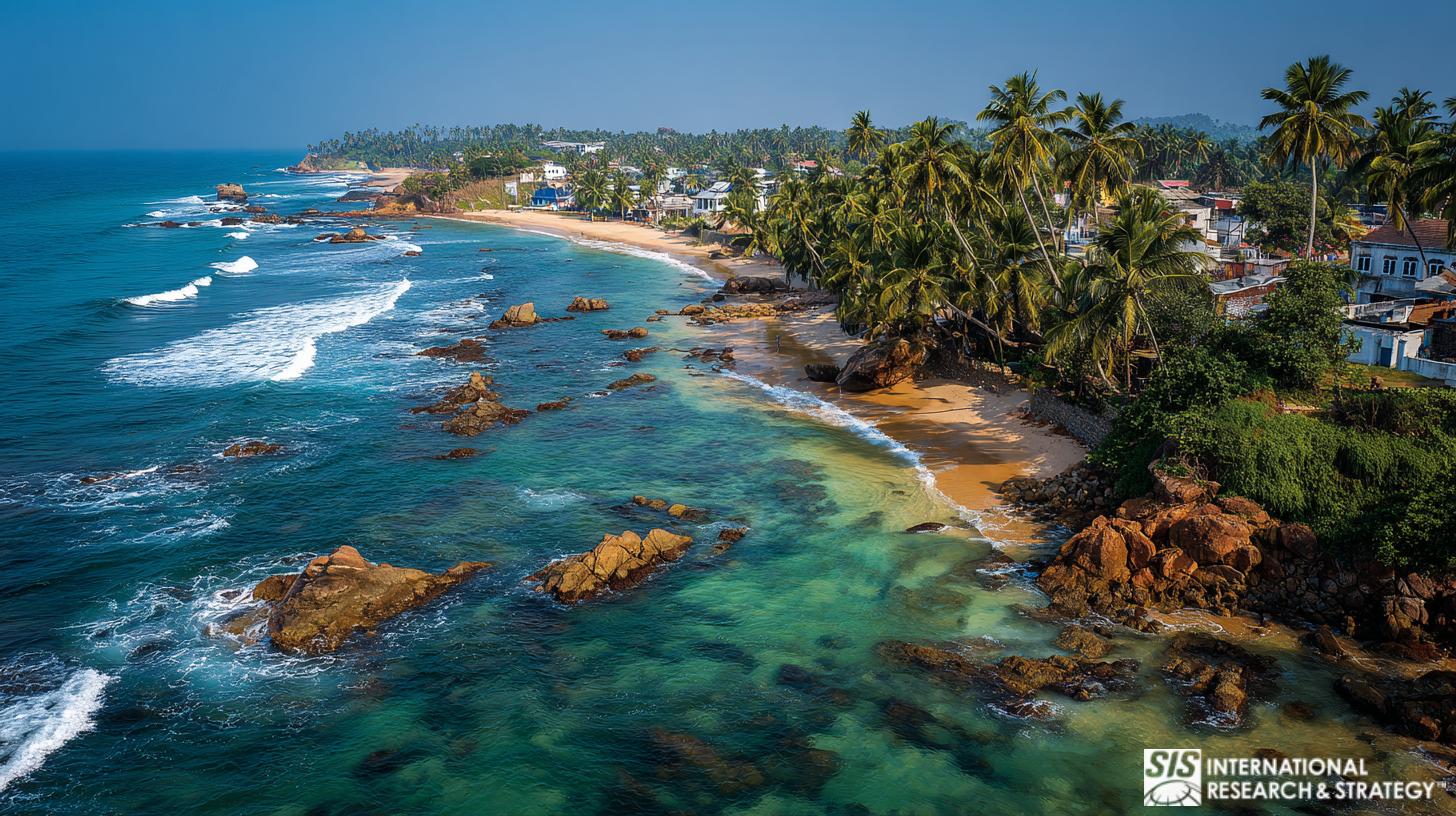Marktforschung in Sri Lanka

Market research in Sri Lanka is essential for businesses looking to succeed in this South Asian nation. Sri Lanka’s economy is experiencing growth across sectors like tourism, manufacturing, and agriculture, and companies need accurate data to capitalize on these developments. By conducting comprehensive market research, businesses can understand the local market dynamics and craft strategies that align with Sri Lanka’s evolving business environment.
Schlüsselindustrien
Sri Lanka’s economy is diverse, with several key industries driving growth and development. Here are the primary industries that play a significant role in the country’s economy:
Tourismus: A major contributor to Sri Lanka’s GDP, driven by its natural beauty, rich cultural heritage, and growing eco-tourism sector.
Landwirtschaft: Focused on the production and export of tea, spices, rubber, and coconuts, agriculture is a vital part of Sri Lanka’s economy.
Textiles and Apparel: Sri Lanka is a hub for high-quality garment manufacturing, exporting textiles and apparel to global markets.
Tea Industry: Known for producing some of the finest tea in the world, Sri Lanka’s tea industry is a leading exporter and a cornerstone of its agricultural sector.
Rubber Industry: The country is a key global player in rubber production, supplying natural rubber for various industries.
Fischerei: Contributing to the local food supply and exports, the fishing industry remains an important sector for Sri Lanka’s coastal communities.
Information Technology (IT) and Business Process Outsourcing (BPO): A rapidly growing sector, with Sri Lanka emerging as a key player in IT services, software development, and outsourced business solutions.
Nachbarschaften

Sri Lanka ist eine südasiatische Insel im Indischen Ozean. Sri Jayawardenepura Kotte ist die gesetzgebende Hauptstadt im Südwesten des Landes, etwa fünf Meilen südöstlich von Colombo (der Handelshauptstadt). In dieser Stadt gibt es Regierungsbüros und viele Menschen leben auch.
Furthermore, Colombo is the commercial capital and most populous city of Sri Lanka. It is a port city in the south of the country with one of the largest man-made docks in the world. Most of Sri Lanka’s foreign trade takes place in this city. One of the outstanding buildings in Colombo is the Clock Tower. Others include the Galle Face Hotel, St. Lucia’s Cathedral, and the Town Hall.
Trends
Sri Lanka steht vor vielen Herausforderungen. Es hat beispielsweise eine hohe Staatsverschuldung, die es bedienen muss. Dennoch wird prognostiziert, dass sich das Land erholen wird. Die globale und inländische Wirtschaftstätigkeit nimmt zu. Diese Trendwende ist auf den gestiegenen privaten Konsum und die niedrigen Zinsen zurückzuführen. Die Exporte werden steigen, da die Nachfrage in den meisten großen Märkten zunimmt.
Geld, das aus dem Ausland in die Heimat geschickt wird, und Kleiderexporte sind Sri Lankas größte Devisenbringer. Es folgt der Tourismus. Die Branche steckte aufgrund der jüngsten Terroranschläge und der Pandemie in einer Krise, hat aber das Potenzial, im nächsten Jahrzehnt zu wachsen und aufzublühen.
Also, the World Bank has been supporting Sri Lanka for a long time now. With private sector investments, the government will be in a better position to meet the people’s needs.
Vorteile und Stärken im Markt
Sri Lanka ist ein Entwicklungsland, in dem viele Menschen ihren Lebensunterhalt mit der Landwirtschaft verdienen. Dieser Sektor trägt ein Fünftel zum BIP bei. Außerdem ist ein Viertel der Bevölkerung des Landes in diesem Sektor beschäftigt. Teeexport und Reisproduktion sind weitere Einnahmequellen in Sri Lanka.
Challenges in Sri Lanka’s Market
One of the key challenges is Sri Lanka’s evolving regulatory environment. The country has made significant strides in reforming its economic policies, but navigating local regulations can still be complex for foreign and domestic businesses alike. Market research in Sri Lanka helps businesses stay updated on legal requirements and compliance issues, allowing them to avoid costly missteps.
Another challenge identified through market research in Sri Lanka is the country’s infrastructure development. While improvements are underway, businesses may still face logistical challenges related to transportation, supply chains, and access to resources, particularly in rural areas. Understanding these infrastructure limitations is crucial for businesses planning their distribution strategies or supply chain operations.
Additionally, the economic impact of global fluctuations—such as changes in commodity prices or foreign exchange rates—can create financial risks for businesses operating in Sri Lanka. Market research in Sri Lanka provides businesses with insights into how these external factors may affect the local market and helps them develop contingency plans.
Verbraucherbasis
Consumer spending has increased over the years in Sri Lanka, as has personal saving. Sri Lankans would rather have new and foreign products, while domestic goods and services are less popular. Still, introducing a new and fresh entity can be a good move if marketed properly.
Gründe, Ihr Geschäft auf dem Markt auszubauen
Sri Lanka ist eines der aufstrebenden globalen Zentren für den Geschäftsverkehr. Hier sind einige Gründe, warum Sie über eine Geschäftstätigkeit auf diesem Markt nachdenken sollten.
Firstly, Sri Lanka’s location is excellent. It is at the midpoint of two major shipping routes: Asia and Europe. This location is great for doing business and is also useful because it enables companies to enter newer markets. Companies benefit from the ease of shipping their products.
Besides, business owners in Sri Lanka have a free trade agreement with much of the world. This free trade agreement applies to both start-up and existing companies. Furthermore, there are no tariffs on the goods and services that they trade.
How SIS International’s Market Research in Sri Lanka Helps Businesses
SIS International’s market research in Sri Lanka offers valuable insights and strategies to help businesses succeed in this dynamic market. By providing tailored research solutions, we equip companies with the information they need to make informed decisions. Here are seven key benefits of working with SIS International for market research in Sri Lanka:
Local Consumer Insights: We provide businesses with detailed knowledge of local consumer behavior, helping them adapt their products and marketing strategies to the diverse Sri Lankan market.
Risikominimierung: Our research helps businesses identify potential challenges, such as regulatory hurdles and infrastructure limitations, allowing them to plan accordingly and minimize risks.
Richtlinien und Compliance: We help businesses understand the local legal and regulatory framework, ensuring they can navigate compliance issues smoothly and avoid costly delays.
Identifying Market Gaps: By analyzing the competitive landscape, we help businesses uncover untapped opportunities in Sri Lanka’s key sectors such as tourism, textiles, and agriculture.
Competitive Positioning: SIS International offers businesses in-depth competitor analysis, providing insights into how they can differentiate themselves in a highly competitive market.
Growth Strategy Development: We deliver actionable recommendations to help businesses develop long-term growth strategies, aligning their goals with emerging trends in Sri Lanka’s economy.
Sustainable Business Planning: With a focus on long-term success, our market research helps businesses craft strategies that account for both immediate opportunities and long-term sustainability.
Über Marktforschung in Sri Lanka
Would you like to start a business in Sri Lanka? SIS International does Quantitative, Qualitative, and Strategy Research for both start-up and existing entities. We also offer Focus Groups, Surveys, and Interviews. Market Research provides insight, data, tools and guidance for decision making. Please feel free to contact us to help set up your business in Sri Lanka.
Über SIS International
SIS International bietet quantitative, qualitative und strategische Forschung an. Wir liefern Daten, Tools, Strategien, Berichte und Erkenntnisse zur Entscheidungsfindung. Wir führen auch Interviews, Umfragen, Fokusgruppen und andere Methoden und Ansätze der Marktforschung durch. Kontakt für Ihr nächstes Marktforschungsprojekt.

